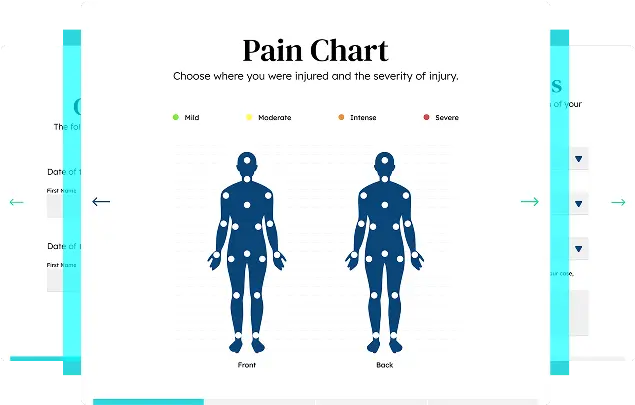Boston Personal Injury Lawyer
At DiBella Law Injury and Accident Lawyers, every case is personal. Our legal team has nearly two decades of experience protecting the rights of injury victims.
Get Free Advice About The Compensation You Deserve
Home » Boston Personal Injury Lawyer
Reviewed by: Christopher DiBella
March 25, 2025
On This Page
- How Do Our Personal Injury Lawyers Help?
- Boston Personal Injury Cases We Handle
- What Kind of Compensation Can You Receive in a Boston Personal Injury Claim?
- Common Injuries Claimed in Boston, MA
- Boston Personal Injury Attorneys Will Fight Insurance Companies for Maximum Compensation
- Massachusetts’ Statute of Limitations for Personal Injury Lawsuits
- I’m Not Sure I Can Afford a Lawyer. How Are Personal Injury Lawyers Paid for Their Services?
- Contact Our Personal Injury Law Firm in Boston Today for a Free Consultation
If another person’s carelessness caused you harm, our Boston personal injury attorneys will fight to get full compensation for your losses. Call us today for a free initial consultation.
How Do Our Personal Injury Lawyers Help?
Boston operates under the laws of the Commonwealth of Massachusetts, which states that anyone who contributed to your injuries in any way can be held liable in a personal injury claim. Therefore, you have a right to be compensated by the negligent party.
A case is decided based on the defendant’s “duty of care,” a legal concept that a person should exercise reasonable caution to ensure others are not hurt. Our legal team will work to ensure that the negligent party is held accountable and you receive compensation for your injuries.
Boston Personal Injury Cases We Handle
Boston Car Accident Lawyer
If you’ve been in a car accident in Boston, an experienced car accident lawyer can guide you through the legal process and help you seek the compensation you deserve. Studies show that victims who hire a lawyer often receive settlements that are significantly higher, sometimes up to 50% more, compared to those who handle claims independently.Boston Motorcycle Accident Lawyer
A specialized motorcycle accident lawyer in Boston can provide the legal support needed to help motorcycle accident victims secure fair compensation for their injuries. Research indicates that those who hire specialized legal representation typically receive settlements that are about 40% higher than those who do not.Boston Truck Accident Lawyer
Handling truck accident claims requires specialized knowledge due to the complexity of the regulations involved. A Boston truck accident lawyer can provide this expertise and help victims secure fair compensation. Statistics show that truck accident victims who work with specialized lawyers generally receive settlements up to 40% higher than those who proceed without legal assistance. We also represent a broad range of other personal injury cases. Our firm is comprised of:-
Boston bus accident lawyers
-
Boston boat accident lawyers
-
Boston pedestrian accident lawyers
-
Boston dog bite injury lawyers
-
Boston premises liability lawyers
-
Boston construction accident lawyers
-
Boston train accident lawyers
-
Boston harbor worker longshoremen lawyers
-
Boston medical malpractice lawyers
-
Boston nursing home neglect or abuse lawyers
-
Boston child injuries lawyers
-
Boston wrongful death lawyers
What Kind of Compensation Can You Receive in a Boston Personal Injury Claim?
The financial impact of an accident can be long-lasting, threatening you and your family’s financial security. However, if you were injured by someone’s negligence, you have a right to recover all your accident-related expenses from the negligent party.
As the injured party, you could qualify for the following economic and non-economic damages:
- Medical bills and the cost of future medical treatments
- Property damage
- Lost wages and loss of earning potential
- Pain and suffering
- Diminished quality of life
- Scarring and disfigurement
- Loss of enjoyment of life
Your Boston attorney will help you navigate the complex claims process and work to ensure you recover full and fair compensation. By thoroughly evaluating both current and future losses, they will build a comprehensive case to seek justice on your behalf.
We’ve offered crucial support and guidance to individuals who have suffered injuries, ensuring their financial and emotional well-being.
Common Injuries Claimed in Boston, MA
We regularly handle many types of injuries and understand how the severity of each type of injury can impact your life. Some commonly claimed injuries include:
- Soft tissue injuries
- Broken bones
- Head injuries
- Back injuries
- Nerve damage
- Scarring and disfigurement
- Loss of limb or amputation
If someone else’s negligence caused you to become hurt, you have legal rights. An experienced Boston personal injury lawyer can pursue fair compensation for your medical bills, lost income, and additional damages from any accident-related harms.
Catastrophic Injuries
Any type of injury that will impact the rest of your life is called a catastrophic injury. In most cases, the accident victim will never recover to a point where they can return to work or live independently and care for themselves.
Not only are the medical bills substantial, but the cost of a lifetime of care can easily add up to millions of dollars and must also be considered when seeking compensation.
Common types of catastrophic injuries can include:
- Traumatic brain injuries
- Spinal cord injuries
- Paralysis
- Loss of sight or hearing
- Amputation
- Severe burn injuries
A claim for these types of permanent injuries can include medical bills for care, ongoing treatment, therapy, and long-term assisted living. You can also seek lost wages based on the potential income you would have earned. In addition, you can seek compensation if alterations are needed to make your home accessible.
Facing a catastrophic injury is overwhelming without professional legal assistance. Our Boston personal injury attorneys have years of experience understanding the challenges victims face right after the incident and in the years to come.
Get immediate case evaluation with no cost or obligation to you in less than 5 minutes.

Boston Personal Injury Attorneys Will Fight Insurance Companies for Maximum Compensation
As the victim, you will probably be contacted by the liable party’s insurance company. The adjusters will appear concerned for your well-being and promise to “take care” of you. However, never forget that insurance companies are businesses whose goal is to make a profit, not to look out for your rights.
The documentation and negotiation process can take a lot of time and energy, and the insurance company hopes you will get tired and settle for a small percentage of what you are owed.
You shouldn’t have to bear the financial burden alone when you’ve been injured due to someone else’s negligence. Insurance adjusters try to minimize payouts, but our experienced personal injury lawyers have a track record of success and substantial case results. We will negotiate with adjusters for maximum compensation and take your case to court if they don’t settle for a fair amount.
Massachusetts’ Statute of Limitations for Personal Injury Lawsuits
If you were injured by someone’s negligent or reckless action, you have a limited time to take legal action. Generally, the statute of limitations for personal injury cases in Massachusetts is three years from the date of the accident.
It’s essential to adhere to this deadline, as failing to file within the specified time frame can result in the court dismissing your case, barring you from pursuing any compensation.
However, there may be exceptions in specific cases, so consult an experienced personal injury attorney to understand what time limit applies to your particular situation.
I’m Not Sure I Can Afford a Lawyer. How Are Personal Injury Lawyers Paid for Their Services?
Our firm operates on a contingency fee basis, which means they only get paid if your case results in a settlement or award. This arrangement ensures victims can access legal help, even if they lack funds upfront, as there are no hourly fees.
Attorneys accept the risk of no payment if unsuccessful, motivating strong advocacy to maximize compensation for your pain/suffering, medical bills, and lost wages. This structure works to your benefit – the larger the settlement amount, the greater incentive lawyers have to fight hard on your behalf.
Contingency also means focusing on your recovery rather than unexpected legal costs. We encourage you to discuss your specific situation confidentially; we’ll ensure a clear understanding of fees to ease any financial concerns.
Contact Our Personal Injury Law Firm in Boston Today for a Free Consultation
Accident injuries can turn your life upside down. The stress of handling the legal process while dealing with pain and medical treatment can easily become overwhelming. If you were involved in an accident, DiBella Law Injury and Accident Lawyers, will fight to ensure you get full compensation.
We’ve helped countless victims through the legal process and recovered significant compensatory damages on their behalf. Our Boston personal injury attorneys provide professional legal representation so you can focus on your recovery.
One call to our law firm is all you need to schedule your free legal consultation at our Boston office, located at 659 Massachusetts Ave. There is no fee until we win. Contact us today.
